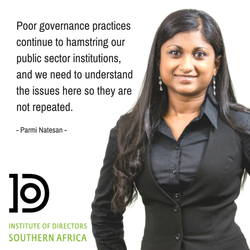 Current news reports relating to the South African Nuclear Energy Corporation (Necsa) indicate once again the damage that poor governance can cause to institutions that are funded by public money and whose influence on society is huge. Insofar as they can be ascertained, the facts seem to be that the board of Necsa suspended the CEO for disciplinary lapses, apparently with the approval of the Minister of Energy, Tina Joemat-Pettersson. Subsequently, the Minister changed track, instructing the board to reverse the suspension, which it refused to do. The Minister then announced a task team to investigate the board. Allegations of political maneuvering ahead of the proposed deal to build nuclear reactors continue to fly. “The ins and outs of this situation are not really the main issue here. The real casualty here is Necsa itself, and by implication the whole process around the forthcoming nuclear build programme,” says Parmi Natesan, Executive: Centre for Corporate Governance at the Institute of Directors in Southern Africa (IoDSA). “Poor governance practices continue to hamstring our public sector institutions, and we need to understand the issues here so they are not repeated.” Suspension of CEO requires balancing act Natesan says that one important issue is the suspension of the CEO. Such an action causes severe damage to the reputation of the individual concerned, obviously, but also to the institution itself. Accordingly, suspension should be seen as a last resort, and only if the board is certain it has all the facts, and that the executive’s continued presence would harm the organisation or interfere with further investigation of the allegations. Suspension can be seen as showing a board’s commitment to accountability, but it also opens it to accusations of bias and the suspicion of prejudgment. Consider the case of the Pikitup CEO, who was suspended for a long period but who has recently been cleared and reinstated. The lengthy and public suspension has caused severe damage to the reputations of both the individual and the company—something that could have been avoided or minimised. However, it’s also worth mentioning that the board has to have confidence in the executive management of the company, and thus must have full control over who holds the executive positions. An additional complication at Necsa is the fact that the executive committee appears to have come out in support of the CEO and thus in opposition to the board. The spectacle of a board at loggerheads with the executives who are supposed to report to it is extremely damaging to the company, and is typically a result of loyalties being divided. The litmus test, she concludes, must always be the company’s best interest and its long-term, strategic goals. Lack of role clarity A second important issue is the lack of role clarity in the public sector, here shown by the way in which the Minister “instructed” the board to perform certain actions. Shareholders appoint Boards to direct and oversee the company, and thus these Boards must be free to exercise their collective judgement and make their own decisions. A powerful, single shareholder can break down this necessary distance, so that the board merely becomes a rubber stamp for the shareholder, or the two are in constant conflict. Another example of this lack of role clarity between the shareholder and the board in the public sector is the Minister of Communications’ attempts to make the SABC board seek her approval on any rule changes to the SABC’s governance, and her determination to appoint Hlaudi Motsoeneng as COO despite the board’s reservations. “Again, the company’s well-being must be paramount. Boards have to be given the space to take a more deliberate, long-term and objective view of the company’s best interests,” she argues. Improper use of funds A third issue concerns allegations that the CEO improperly diverted company funds to the ANC, with allegations of nepotism continuing to break in the media. The question here is whether the CEO acted within the bounds of the powers delegated to him by the board. Delegation of authority is a vital tool used by boards to retain adequate control while enabling the company to operate effectively and efficiently. These allegations also highlight the need for a strong audit committee to oversee the proper use of public money. Each year, the Auditor-General’s reports show increasing levels of fruitless and wasteful expenditure in the public sector; audit committees have a vital role to play in ensuring that processes are put in place to prevent and detect this waste of public money. “In the end, the CEO role is critical for a company’s success,” says Natesan. “The board must act in the company’s best interest, and must be allowed to do so. The minister, representing the shareholder, should also have the company’s well-being at heart, and should desist from undue interference.” ENDS MEDIA CONTACT: Cathlen Fourie, 082 222 9198, [email protected] For more information on the IoDSA please visit: Website: www.iodsa.co.za Twitter: @The_IoDSA LinkedIn: The Institute of Directors in Southern Africa group Comments are closed.
|
Archives
July 2024
Categories
All
|

 RSS Feed
RSS Feed